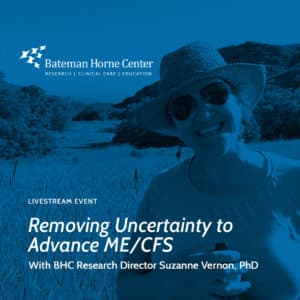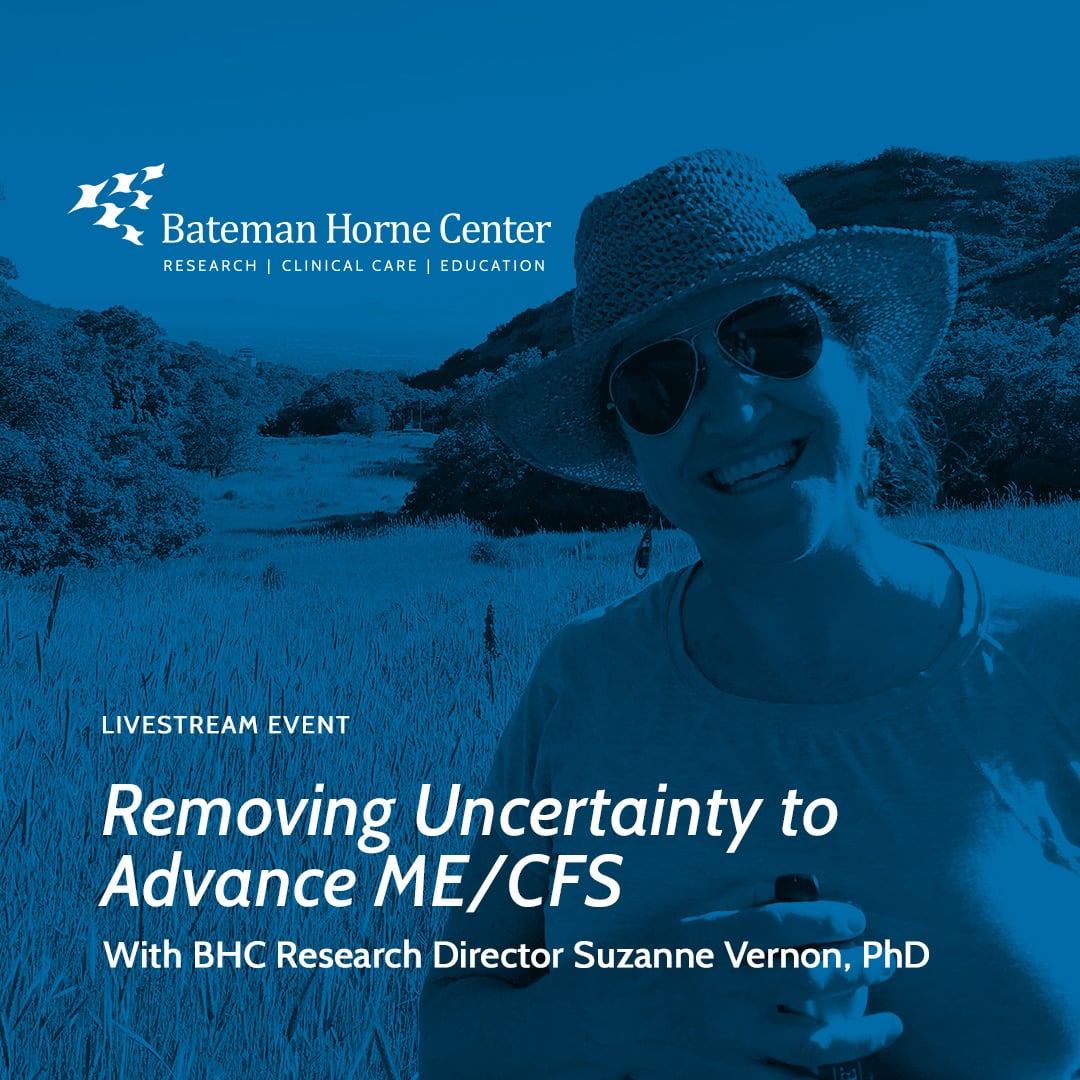 In this month’s education meeting we were delighted to hear from Suzanne Vernon, PhD, research director at the Bateman Horne Center. She has raised millions of dollars for ME/CFS research resulting in over 85 published papers. Dr. Vernon presented the two-pronged approach that the Bateman Horne Center is using to accelerate the state of ME/CFS research and treatment.
In this month’s education meeting we were delighted to hear from Suzanne Vernon, PhD, research director at the Bateman Horne Center. She has raised millions of dollars for ME/CFS research resulting in over 85 published papers. Dr. Vernon presented the two-pronged approach that the Bateman Horne Center is using to accelerate the state of ME/CFS research and treatment.
Prong One: Driving Biomarker Discovery
Everything we do at the Bateman Horne Center begins with our patients, and our research is no different. Close to 80% of our patients participate in research, contributing vital biological samples that are distributed to researchers across the globe. One blood sample is divided into many different portions and examined by many different researchers who generate a host of data and analytics.
Biomarkers are critical since they provide objective markers to a wide-ranging illness; without these biomarkers it is challenging to prompt clinical trials and drug development, as researchers have no objective reference point to use for comparison.
Biomarkers are any biological indication of a disease, which means they can be far more multisystem than a simple virus or bacteria. Identifying them is complicated. That’s why the Bateman Horne Center is combining all the data from all the researchers on each discrete blood sample and supplementing the data with health records full of additional data. In this process, we hope to build a multi-system profile that can access the more complex biological signs of ME/CFS that are not evident in individual research projects. In other words, while each puzzle piece or data may not look important all the puzzle pieces together build up to a big picture that may reveal additional insights.
Prong Two: Developing Objective, Easy-to-Use Measures
The Institute of Medicine (IOM) diagnostic criteria are a massive step forward in understanding ME/CFS. Now we want to make these criteria easy for researchers and physicians to use. We hope this approach will help validate research measures, test the effect of interventions, mainstream a ME/CFS diagnosis, and assist with researching treatments.
The IOM report identifies several core features of ME/CFS: impaired functioning, post exertional malaise, and unrefreshing sleep are required symptoms, in addition to cognitive impairment or orthostatic intolerance. The Bateman Horne Center is developing ways to objectively measure all of these symptoms in a simple, accessible way.
Impaired function can be assessed using Dr. Bateman’s measure: hours of upright activity. This measure checks how often someone’s feet touch the floor, sitting or standing, and is sensitive to both disease severity and orthostatic intolerance. Our partnership with the University of Utah is producing a device that passively measures hours of upright activity without having to rely on patient report. This objective measurement of impaired function gives pharmaceutical companies a solid data set to test medicine against.
Impaired function can also be measured by the 10-minute NASA lean test; a simple exercise where the person leans with their shoulders against a wall for ten minutes. This is an easy and effective way to check for orthostatic intolerance. The system is now being tested at multiple sites to see if it can be replicated and validated as a way to measure some of the effects of ME/CFS.
Cognitive impairment can be measured through reaction time which indicates fatigue level, and attention time which indicates how fast and accurately our brain works. In this test a person’s reaction time and attention time is measured before and after the 10-minute lean test. Preliminary results suggest that controls and patients perform similarly before the lean test, but patients perform worse than controls after the lean test. This measure may help diagnose ME/CFS and show the effects of treatment.
Unrefreshing sleep has traditionally been hard to measure and we still don’t know why it occurs in people with ME/CFS. However, we are making progress on measuring it in an effective way. Sleep studies are the common route to checking unrefreshing sleep, but they are short-term and invasive. Wearable technology, on the other hand, is non-invasive and can measure sleep and heart-rate variability for long periods of time. We have high hopes that wearable technology, like the Oura ring, can provide accessible and useful objective measurements of unrefreshing sleep.
How Effective is Our Approach?
We have been using this two-pronged approach of driving biomarker discovery and developing objective measures for two and a half years. In that time, we have partnered with ten different research organizations and are regularly attracting new partners from the areas of research, pharmaceutical, and wearable technology. Two recent partnerships include a company called Cortene who want to develop an ME/CFS treatment drug, and another to investigate whether non-invasive vagus nerve stimulation can improve symptoms.
Overall, we have seen success in driving forward the state of ME/CFS research. Furthermore, we are fully on board in continuing and amplifying our efforts until the illness is mainstreamed and treated with the full expertise and compassion that people deserve.
If this content has been useful to you or a loved one, we invite you to check out our free online class series, explore our video library, and subscribe to our monthly newsletter. We thank you for your continued support as we aim to improve today’s quality of life for ME/CFS and fibromyalgia patients everywhere.
Please consider making a donation to BHC, a 501 (c)3 nonprofit organization today.

 Lucinda Bateman, MD, is a renowned clinician, researcher, and educator. Her Johns Hopkins University Medical School training instilled an approach to care that she has employed throughout her career - the patient comes first and the unknown or unexplained does not equate to a lack of proper and compassionate care. Since starting her own practice in 2000, she has served on six boards or committees, been the principal investigator for 45 studies, authored/coauthored 40 journal articles, served as adjunct instructor and adjunct assistant professor in the University of Utah Departments of Preventative Medicine, Internal Medicine, and Anesthesiology, and lectured around the world.
Lucinda Bateman, MD, is a renowned clinician, researcher, and educator. Her Johns Hopkins University Medical School training instilled an approach to care that she has employed throughout her career - the patient comes first and the unknown or unexplained does not equate to a lack of proper and compassionate care. Since starting her own practice in 2000, she has served on six boards or committees, been the principal investigator for 45 studies, authored/coauthored 40 journal articles, served as adjunct instructor and adjunct assistant professor in the University of Utah Departments of Preventative Medicine, Internal Medicine, and Anesthesiology, and lectured around the world.